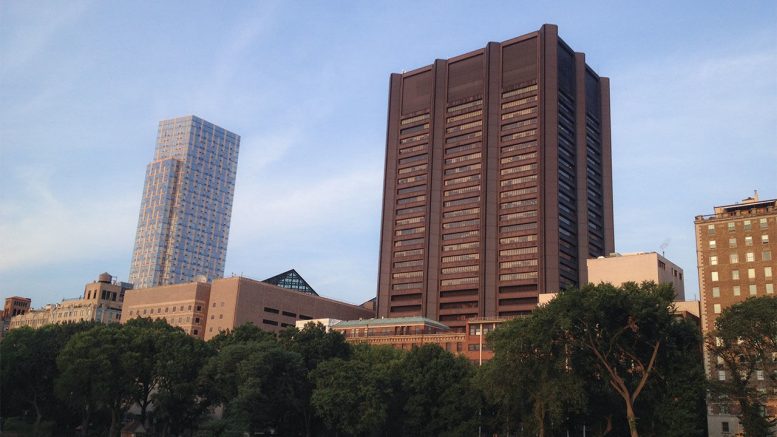The faculty and staff letter follows a similar letter to the board sent on 6 May by more than 300 Mount Sinai medical students. “We are compelled to speak out by the shocking acts of discrimination on the basis of gender, age, and race described in the lawsuit,” the students wrote.
Here is our original story from 2 May:
Seven current and former female employees have sued officials at a global health institute that is part of the Mount Sinai Health System’s Icahn School of Medicine in New York City, claiming age and sex discrimination. They claim the medical school’s dean, Dennis Charney, hired an underqualified man to direct the center, and allege that the director then drove out women who were in their 40s and older and preferentially hired younger men. An eighth plaintiff on the lawsuit, a man, claims discrimination based on race, religion, and national origin.
The 174-page lawsuit, filed on 26 April, names as defendants Charney and three men at the Arnhold Institute for Global Health (AIGH), which designs technology and systems to improve the health of poor communities. It makes a number of allegations against center Director Prabhjot Singh, who was hired in 2015, including that he disparaged, demoted, and marginalized female employees; lied to funders about the status of a software project; and did not seek required ethics reviews for some research projects.
The plaintiffs also allege that Singh countenanced abuse of female employees by David Berman, who was Singh’s chief of staff at the time, and Bruno Silva, the institute’s director of design and product development. Silva, the lawsuit alleges, called female co-workers and donors “bitches” and “c—s,” and that Singh “did nothing to curb him.” Berman “was known for violent screaming at women … which Singh nonchalantly ignored,” the lawsuit alleges.
Berman, who could not be reached for comment, left the institute last summer. The Icahn School of Medicine declined to make Charney, and the two other defendants who still work at AIGH, available for interviews. The medical school said it does not comment on pending litigation but stated that: “We deny the allegations of discrimination … [and] expect to vigorously defend the action.” It also noted that, “Consistent with the School of Medicine’s longstanding commitment to equity and inclusion, when employees in the Institute for Global Health brought concerns to our attention last year, we promptly initiated an internal review after which appropriate steps were taken.”
The lawsuit, which was filed in U.S. District Court for the Southern District of New York, alleges that the internal review, which was prompted by a complaint from some of the plaintiffs and other employees, was insufficient, as were the resulting actions. And it paints an unflattering picture of Charney, a prominent neurobiologist and psychiatrist. It depicts him driving away a senior woman who had been chosen by a search committee to lead AIGH, and instead hiring Singh, who was 32 years old at the time.
Singh has a medical degree from Cornell University and a doctorate in neural and genetic systems from Rockefeller University in New York City. He was a visiting assistant professor of international and public affairs at Columbia University from 2011 to 2015 and was a staff associate and then a postdoctoral scientist at Columbia’s Earth Institute from 2007 to 2011.
The lawsuit alleges that Singh wanted to remake AIGH into a Silicon Valley–like startup with a “bro culture” dominated by young men. “Dr. Singh directly [hired] largely younger, male friends and contacts, despite their lack of experience in global health,” states a press release issued by McAllister Olivarius, a law firm in Saratoga Springs, New York, that is representing the plaintiffs. “He disbanded the Institute’s Advisory Board, an important source of fundraising, because he considered its members ‘ladies who lunch.’”
The plaintiffs include Holly Atkinson, 66, a physician and former medical journalist who built and directed the human rights program at AIGH. The lawsuit states that in 2015, Singh demoted Atkinson from her director position, began to assign her tasks such as maintaining a Mailchimp list, and told her she would have to take a pay cut of $60,000 if she wanted to remain on staff. Atkinson left the institute in 2016.
Another plaintiff, Natasha Anushri Anandaraja, 44, is a pediatrician and tropical medicine expert who directed global health education at AIGH. Singh “regularly denigrated Anandaraja’s work with harsh and cutting critiques,” the lawsuit alleges. “[H]e was careful not to leave a paper trail demonstrating his frequent cruelty.” Anandaraja left the center in 2016. (She has since returned to Mount Sinai part time in another capacity and does not report to Singh.)
The male plaintiff, Humale Khan, is a computer scientist who left the institute in February. He and other plaintiffs allege that Singh misled funding groups about a software project supported by the U.S. Agency for International Development in Washington, D.C. Singh, the lawsuit alleges, told funders the project was advancing and had hundreds of users, when it was in fact “vaporware … a vague collection of specifications and unfinished code.” The lawsuit also alleges that Singh violated a law meant to protect patient data and failed to get required ethics committee approvals for some projects involving human subjects.
AIGH had been called Mount Sinai Global Health. But after a $12.5 million, 2013 donation from the Arnholds, a prominent New York banking family, it was renamed in their honor.
*Correction, 4 May, 7 p.m.: This article has been updated to correct Prabjhot Singh’s previous positions at Columbia University.
Source: www.sciencemag.org




